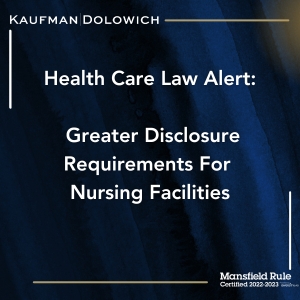Greater Disclosure Requirements For Nursing Facilities, by Christopher Tellner, Esq. and Abbye Alexander, Esq., 3-19-2024
 Nursing facilities are now faced with greater disclosure requirements under a new rule set forth by the Centers for Medicare & Medicaid Services (CMS) meant to create greater transparency of nursing home ownership. The rule, which became effective January 16, requires the disclosure of certain ownership, managerial, and other information from facilities participating in Medicare (SNFs) and Medicaid.
Nursing facilities are now faced with greater disclosure requirements under a new rule set forth by the Centers for Medicare & Medicaid Services (CMS) meant to create greater transparency of nursing home ownership. The rule, which became effective January 16, requires the disclosure of certain ownership, managerial, and other information from facilities participating in Medicare (SNFs) and Medicaid.
It is designed to improve care and accountability at nursing facilities, especially those owned by private equity companies and other types of investment firms. Specifically, the rule implements portions of section 6101 of the Affordable Care Act. Section 6101(a) of the Affordable Care Act, signed into law on March 23, 2010, added a new section 1124(c) to the Social Security Act (the Act), establishing requirements for the disclosure of information about nursing home ownership and oversight.
The finalized rule requires nursing facilities to report the following information:
- Each member of the facility’s governing body, including the name, title, and period of service of each member.
- Each person or entity who is an officer, director, member, partner, trustee, or managing employee of the facility, including the name, title, and period of service of each such person or entity.
- Each person or entity who is an “additional disclosable party” of the facility. Additional disclosable party is defined as a person or entity that:
- Exercises operational, financial, or managerial control over the facility or a part thereof, or provides policies or procedures for any of the facility’s operations, or provides financial or cash management services to the facility;
- Leases or subleases real property to the facility, or owns a whole or part interest equal to or exceeding 5 percent of the total value of such real property; or
- Provides management or administrative services, management or clinical consulting services, or accounting or financial services to the facility.
- The organizational structure of each additional disclosable party of the facility and a description of the relationship of each such additional disclosable party to the facility and to one another.
The Act defines “organizational structure” as meaning, in the case of —
- A corporation—The officers, directors, and shareholders of the corporation who have an ownership interest in the corporation which is equal to or exceeds 5 percent;
- A limited liability company—The members and managers of the limited liability company (including, as applicable, what percentage each member and manager has of the ownership interest in the limited liability company);
- A general partnership—The partners of the general partnership;
- A limited partnership—The general partners and any limited partners of the limited partnership who have an ownership interest in the limited partnership which is equal to or exceeds 10 percent;
- A trust—The trustees of the trust;
- An individual—Contact information for the individual; and
- Any other person or entity, such information as the Secretary determines appropriate.
In addition to the Section 6101(a) disclosures, the rule also established definitions of private equity company and real estate investment trust (REIT) for purposes of Medicare enrollment, setting the stage for Medicare SNFs to disclose whether each direct and indirect owning or managing entity is a private equity company or REIT, according to CMS.
Medicare SNFs and Medicaid nursing facilities will need to disclose the data outlined in section 1124(c) upon initial enrollment and revalidation. Medicare SNFs will also have to: (1) report this information as part of any change of ownership pursuant to 42 CFR § 489.18; and (2) report any change to this data within the timeframes specified in 42 CFR § 424.516(e).
For Medicare SNFs, the data will be reported via the Form CMS-855A Medicare enrollment application. For Medicaid nursing facilities, the data will be reported via means prescribed by the state.
The new rule creates new complexities and regulatory burden on nursing facilities. If you need assistance navigating the new rule, the Health Care/Managed Care attorneys at Kaufman Dolowich have a deep understanding of the complex legal landscape and rapidly changing business environment that health care providers operate within. We regularly advise clients in this sector on matters that uniquely affect the health care industry as well as the full range of legal matters that affect health care business operations.










